|
Details
|
| Descriptions |
Action
Card
A card which can
be played during the ACT phase (using ATK points) in combination with an
Item Card, or during the DEF phase (using DEF points). These
include attack enhancements, techniques and defensive cards.
Assist Card
A card which can
be played during the SET phase (using ATK points) to affect either you
or your opponent(s), or everyone. These include (but are not limited
to) various rules changes, like dice, resistance and hand size modifiers.
Item Card
A card which can
be played during the SET phase, moved during the MOVE phase, and used for
your attack during the ACT phase. These uses require ATK points,
unless the Item Card has the proper special ability. These include
any weapon, shield, mag and monster cards. |
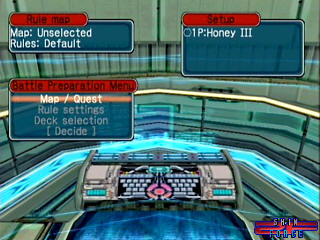 |
Lobby:
Enter an
online/offline game and make desired preparations for battle. Walk
over to the Battle Room Terminal and access the Computer. Select
"Map / Quest" -- if you're online, you'll be given an additional choice
of "Free Battle" (you select map/rules/Story Characters), or "Random" (CPU
selects map/rules/Story Characters).
|
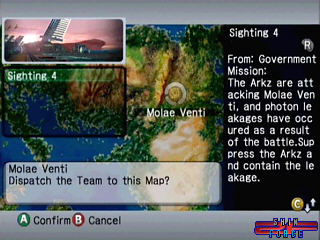 |
Options:
Select a
Map from the choices given (as pictured, there may only be one choice).
Select "Rule settings" to make changes (if allowed). Next, go to
"Deck selection" and pick the deck you'll use for yourself (and the Story
Characters, if allowed). Finally, select "Decide" to begin the match.
Note: not all decks are available for every battle -- some battles
have Story Character class restrictions.
|
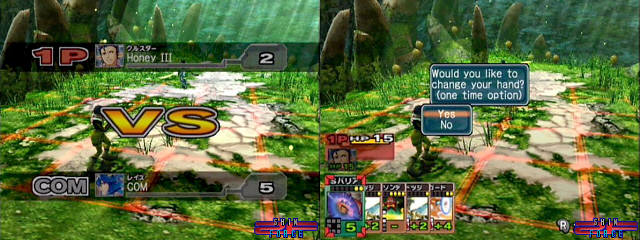 |
Begin
Battle:
The highest
roll determines which side/team gets to act first (pictured above-left).
You'll receive your first hand of 5 cards, and be given the option to use
it or be dealt a new hand (pictured above-right). As you can see,
this is a one-time option given at the beginning of every battle.
|
Attack
/ Player's Turn | Attack Phase
Note: not
all of the following pictures occured in the same round. |
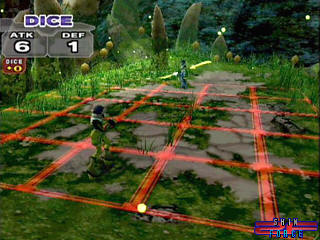 |
#1
DICE:
The Player's
Attack Phase always begins with a roll of the dice to determine your ATK
(attack) and defense DEF (defense) points. Note: your roll
can be affected by a bonus roll (indicated by the "Dice +0"), somebody
having played a roll Assist
Card, or the alteration of the min/max roll
rule.
|
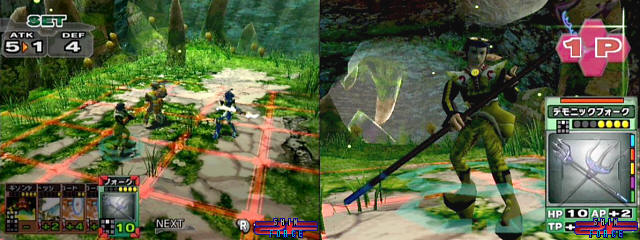 |
#2
SET:
It's time
to SET your Item Cards,
based on your current ATK points. Each card has an ATK points value
which is indicated by the yellow dots below its title (see above-right
-- the DEMONIC FORK has a value of 4 ATK points). You may have a
total of 8 ATK points worth of Item Cards
played at any given time. Any combination of your ATK points being
too low to play an Item Card
in your hand; you have no Item Cards
in your hand; or you don't have enough total ATK points left to play an
Item
Card, results in you being unable to do
anything in the SET phase. Note: your opponent's play of Assist
Cards may hamper your ability in the SET phase
as well.
|
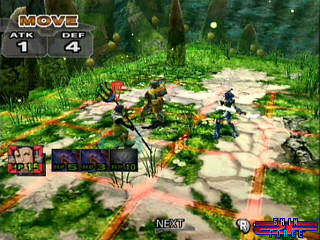 |
#3
MOVE:
In the MOVE
phase, you may use any leftover ATK points from the current roll to strategically
move your Story Character (SC), or any monster cards (Darkside) you have
played. Each SC and monster has a set movement distance per turn,
which can be affected by Assist Cards.
Note: other factors, including terrain, status disorders and surrounding
foes, can limit your movement.
|
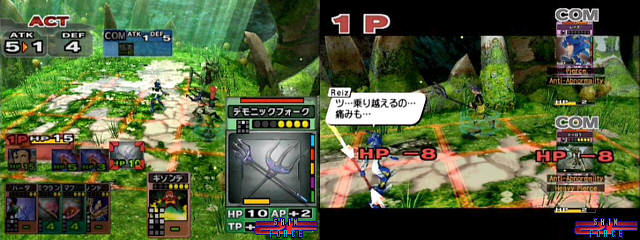 |
#4
ACT:
During the
ACT phase, you may use any leftover ATK points to attack the enemy with
your Item Cards,
and Action Cards
(for combos). Each Item Card
you've played has a set attack range, which is displayed on the card with
the small grid of 9 squares. In the case of the DEMONIC FORK (shown
above-left), it's range is only one square (vertically or horizontally).
Using a weapon by itself costs 1 ATK point. However, in this example
(above-left), the Gizonde Action Card
is being combined with the DEMONIC FORK Item
Card (at a total cost of 4 ATK points
- determined by the Action Card's
ATK point cost) to extend the range with a technique attack. That
attack caused HP -8 damage to the Story Character (SC) opponent and Tollaw
monster cards (pictured above-right). Notwithstanding possible Assist
Cards played, Item
Cards which are reduced to 0 HP are put
into the discard pile. Also, you gain various amounts of battle EXP
for defeating enemy Item Cards.
When battle EXP is maxed, your Dice modifier goes up by +1. Note:
if you have them in your hand and have the ATK points to use them, many
other Action Cards
can be played to combo with your Item Cards.
Chain combos are possible as well.
|
 |
#5
DRAW:
A standard
hand consists of 5 cards. In the DRAW phase, you can strategically
discard unwanted cards you may have in your hand, which will be replaced
by drawing from the deck. Note: the number of cards in your
hand may be affected by playing certain Assist
Cards.
|
Defense
/ Opponent's Turn | Defense Phase
Note: the
following pictures did not occur in the same battle. |
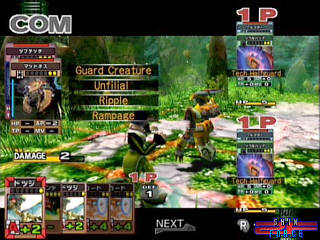
 |
Defense
Phase:
Each Opponent
goes through the same 5 steps as outlined in the "Attack / Player's Turn"
portion of a battle. The CPU opponent's ACT phase (your DEF phase)
is pictured to the left. You may use your current DEF points to play
Action
Cards which will defend against these
attacks (assuming you have any in your hand). The top example shows
a defense Action Card
being selected which will lower the CPU's attack score by 2 points (at
a cost of 1 DEF point), while the CPU's damage attack score is also 2.
The actual HP your Item Card(s)
will lose is the CPU's attack score minus the effect of any defense Action
Card(s) you may have played. In
other words, the actual outcome of this example is HP -0 (attack successfully
defended). The bottom example shows Player 1's weapon has 0 HP, yet
is still being used. This is a result of an Assist
Card being played which delays the discard
of Item Cards
that are reduced to 0 HP.
|
| Note:
Once each player has completed their Attack Phase, the battle continues
with the Attack / Player's Turn. If the time has expired (battles
can have various time limits), or a Story Character's HP is 0, then the
battle is over and Victory is determined. |
 |
RANKED:
Once Victory
conditions have been met, you are ranked, awarded level EXP points and
given a couple statistics pages to view. Note: S-rank is the
best while E-rank is the worst. Also, you have a separate online
and offline level.
|
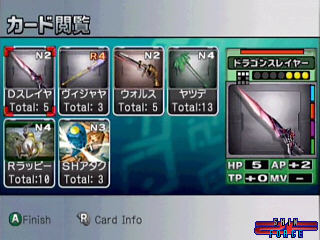 |
AWARDS:
The number
of cards awarded to you depends on the rank or loss of your battle.
I've received as many as 9 cards for an S-rank victory, while a loss always
results in a 2 card award. In the example to the left, a C-rank victory
yielded 6 cards. Note: any new cards you win will be highlighted
with a "NEW" on them. Also, online Tournament wins are awarded with
varying amounts of Meseta.
|
|